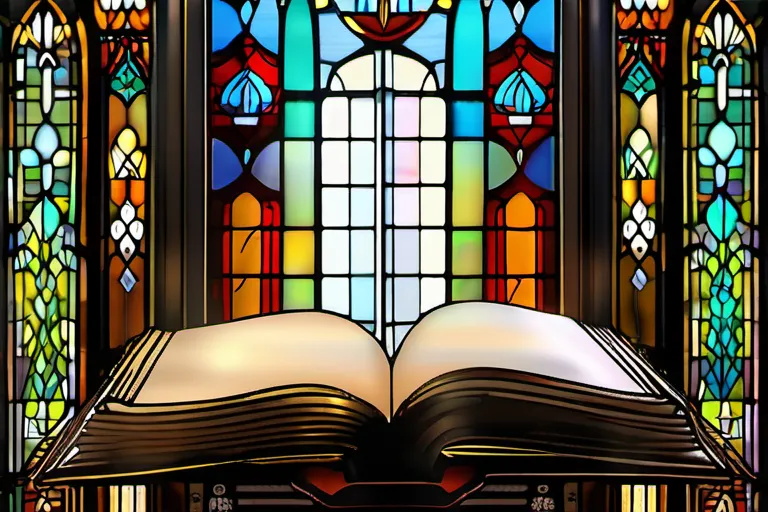Exploring the spiritual beliefs and influences on C.S. Lewis’s life and works
C.S. Lewis, a renowned author best known for his ‘Chronicles of Narnia’, was also a prominent Christian apologist. This article provides an overview of the religious beliefs that shaped his life and works.
Early Life and Influences
Imagine stepping into C.S. Lewis’s Oxford home, a place where the air seems to hum with intellectual and spiritual debates. How could one person’s life so intricately intertwine with religion? Born on November 29, 1898, in Belfast, Northern Ireland, Lewis grew up in an environment rich with family discussions and an early exposure to various religious beliefs.
What was the impact of his childhood home on C.S. Lewis’s spiritual journey? His father, Albert, was a lawyer who often brought home literature from his work, creating a stimulating intellectual atmosphere. However, it is perhaps his mother, Flora, who left an indelible mark. She read widely and instilled in young C.S. a love for stories and mythology that would later resonate in his own works.
During the First World War, Lewis’s life took a turn. He served as a junior officer in France, where would he find the comfort and solace he sought? His experiences during those tumultuous years were marked by loneliness and fear, but also an internal questioning of his beliefs. It was here that the seeds of his later conversion to Christianity began to take root.
The influence of his family’s faith was clear, yet it wasn’t until much later that Lewis would fully embrace it. How did his early exposure shape his later works? In his youth, he dabbled in various religious ideas, often engaging with the beliefs of others through literature and discussion groups at Oxford. This exposure to different viewpoints nurtured his understanding of religion’s complexity and depth.
Was there a pivotal moment that pushed C.S. Lewis towards embracing Christianity? The answer lies not just in one event but in a series of intellectual and emotional awakenings. As he delved deeper into Christian theology and philosophy, the idea of God became less abstract and more personal. This transformation was gradual yet profound, shaping his later works with a blend of philosophical inquiry and spiritual insight.
Through these early influences and experiences, C.S. Lewis’s religious journey begins to unfold. From his childhood home filled with books to his military service during World War I, each chapter of his life contributed to the rich tapestry of his future beliefs and writings. The question remains: how did these formative years lay the groundwork for his profound spiritual transformation?
Conversion to Christianity
Can you give an overview of C.S. Lewis’s religion? It’s a question that has captivated countless readers, who find in his works a profound exploration of faith and spirituality. Lewis, known for his sharp intellect and articulate prose, embarked on a remarkable spiritual journey that transformed both himself and the way we understand faith today.
Let us delve into the events leading to C.S. Lewis’s conversion to Christianity. Born in Belfast, Northern Ireland, in 1898, Lewis grew up in a household steeped in literature and debate. His early life was marked by a philosophical curiosity that often clashed with his Christian upbringing. For much of his youth, he remained skeptical about the existence of God, viewing religion as a relic of the past, like his collection of stuffed animals from childhood.
It wasn’t until 1929, when Lewis began studying at Oxford University, that the seeds of his conversion started to take root. He was influenced by the works of G.K. Chesterton and J.R.R. Tolkien, both of whom were staunch Christians. The conversations with Tolkien, particularly about religion and mythology, became a turning point in Lewis’s intellectual journey.
One pivotal moment that stands out is when Lewis read C.S. Pierce’s “The Ideal and the Real,” which challenged his atheistic views by proposing that there could be a rational basis for believing in God. This idea sparked an internal debate within Lewis, leading him to question everything he had ever known about religion.
Another significant influence was the poetry of Robert Frost, whose work often explored themes of nature and faith. Lewis found himself drawn to the idea of finding meaning in the world around him, suggesting that there might be a deeper purpose behind it all.
The final push came with Lewis’s reading of Miracles by G.K. Chesterton. In this book, Chesterton argued for the rationality and necessity of miracles in understanding faith. This argument resonated deeply with Lewis, prompting him to reevaluate his stance on Christianity. It was a gradual process, but eventually, Lewis found himself embracing the Christian faith, much like gradually turning the pages of a book to uncover its full meaning.
In this journey, C.S. Lewis’s conversion from skepticism to belief was not just personal; it was also deeply intellectual. His experiences and reflections on faith are woven into his literary works, offering readers a rich tapestry of spiritual exploration and insight.
The Influence of Christian Theology on His Works
Can you give an overview of C.S. Lewis’s religion and how it influences his works? Delving into this question, we must explore the deep spiritual underpinnings that shaped his life and narratives. Christian theology, in particular, is woven so intricately through the fabric of his renowned The Chronicles of Narnia.
In these tales, Lewis creates a world where faith and wonder intertwine, much like how Christian beliefs interplay with human experiences in his own life. For instance, when Aslan, the lion who embodies Christ, sacrifices himself to save Edmund, it’s not just a fantastical event but a powerful allegory of redemption and grace.
Consider the White Witch’s dominion over Narnia as an example of original sin, where freedom is lost, echoing the fall from innocence in Christian tradition. The characters’ journey to regain their home reflects Lewis’s own spiritual odyssey—how he grappled with doubts and eventually found his way back to faith.
The characters’ experiences of joy, forgiveness, and courage are all mirrored by the Christian virtues. Aslan’s resurrection symbolizes hope, much like the promise of eternal life. These themes resonate deeply because Lewis believed that stories could convey truths more profoundly than didactic teachings alone.
In exploring C.S. Lewis’s religion, we see how his faith influenced not just his beliefs but also his storytelling. Through the magic of imagination and narrative, he crafts worlds where spiritual lessons are embedded in every plot twist and character arc. This makes The Chronicles of Narnia more than just a series of children’s books; they become timeless reflections on the human condition and our relationship with the divine.
So, when reading these stories, ask yourself: What spiritual lessons do you find? How does Lewis’s religious perspective shape your understanding of these tales?
C.S. Lewis as a Christian Apologist
Can you give an overview of C.S. Lewis’s religion? It’s as if we’re peeling back the layers of a deeply woven tapestry, where every thread is not just colored but imbued with meaning and significance. For C.S. Lewis, his faith was not merely a private affair but a profound influence that shaped both his inner world and his literary output.
As a Christian apologist, Lewis had a unique approach to defending the Christian faith. He did so not through mere rhetoric or academic argumentation alone, but by weaving together personal stories, philosophical insights, and literary analogies. His most famous work in this domain is undoubtedly The Screwtape Letters, where he uses a letter-writing format to explore moral and spiritual themes.
Wasn’t Lewis’s role as a Christian apologist like guiding lost sheep back to the fold? He was not just preaching from a pulpit but engaging with his readers in the realm of ideas, using their own sense of wonder and curiosity to draw them towards faith. His arguments were often presented through familiar stories, making complex theological concepts accessible.
In Mere Christianity, Lewis outlines key principles of Christian belief that he believes are universally true. He tackles questions about morality, sin, and the existence of God with clarity and honesty, inviting readers to consider these ideas without prejudice. His approach was like a gentle yet persistent breeze, moving people’s minds towards deeper reflection.
Moreover, Lewis wasn’t afraid to engage with critics or skeptics head-on. Works such as A Grief Observed, written after the loss of his wife, and his dialogue with J.R.R. Tolkien in The Lion, the Witch and the Wardrobe, demonstrate his willingness to explore doubts and challenges to faith in a way that resonates deeply with many.
Ultimately, C.S. Lewis’s role as a Christian apologist was about more than just converting others; it was about enriching their lives through the light of Christ. His influence on generations of readers is a testament to his ability to make profound spiritual truths feel both personal and universal.
The Allegory of Love: A Study in Medieval Tradition
Can you give an overview of C.S. Lewis’s religion and how it influenced his life and works? In exploring this, we must delve into the spiritual landscape that shaped the renowned author.
C.S. Lewis was not merely a writer; he was a thinker whose faith deeply intertwined with his literary creations. His journey from atheism to Christianity offers a fascinating narrative of intellectual exploration and personal transformation. How did his spiritual journey begin? Was it through a series of profound conversations or perhaps a single, transformative event?
The Allegory of Love: A Study in Medieval Tradition, one of Lewis’s seminal works, provides an insightful look into his exploration of medieval courtly love. This book is not just an academic study; it’s a journey through the complex emotional and spiritual realms of chivalric romance. How does this work reflect Lewis’s broader interest in Christian symbolism and its roots in ancient traditions?
In The Allegory of Love, Lewis analyzes the themes of courtly love, uncovering layers of meaning that resonate with his own spiritual beliefs. He discusses how these allegorical tales prefigure Christian concepts such as redemption and sacrifice. By examining these medieval narratives, we can see how Lewis uses them to explore deeper theological ideas.
Through this study, C.S. Lewis reveals the interconnectedness of love, devotion, and faith in a way that mirrors his own spiritual growth. His exploration of courtly love highlights themes of self-sacrifice and divine grace, which are central to Christian theology. In essence, The Allegory of Love serves as a bridge between the medieval past and contemporary spirituality.
How did this work shape C.S. Lewis’s understanding of faith and its expression in literature? What lessons can we draw from his analysis for our own spiritual journeys?
C.S. Lewis’s Legacy and Enduring Influence
Can you give an overview of C.S. Lewis’s religion? It’s a question that often surfaces among readers, intrigued by his profound works and the underlying spiritual themes. Was C.S. Lewis simply a Christian writer, or did his faith shape him in ways beyond what we can easily perceive? To explore this, we need to delve into the fabric of his life and writings.
One might ask: how did C.S. Lewis’s journey from atheism to Christianity influence his work? His conversion story is as complex as it is compelling. Lewis once described himself as a ‘trifler with faith,’ but his relationship with God deepened over time, leading him to embrace Christianity more fully. This spiritual transformation wasn’t just personal; it profoundly impacted how he approached storytelling and philosophy.
In his works, C.S. Lewis often uses allegories and metaphors to explore complex religious concepts in a way that resonates deeply with readers. Take The Chronicles of Narnia for instance—each story is a rich tapestry woven with themes of redemption, temptation, and the struggle between good and evil. These narratives are not just fun adventures; they serve as powerful parables, inviting us to reflect on our own spiritual journeys.
But C.S. Lewis’s religious beliefs weren’t just about writing—they shaped his public persona too. His famous debate with Bertrand Russell at Cambridge University in 1947 highlighted the tension between faith and reason, a topic he would revisit in works like Miracles: A Preliminary Study. In this book, Lewis argues that the existence of miracles doesn’t violate our understanding of natural laws but rather challenges us to reconsider the limits of human knowledge.
As we ponder C.S. Lewis’s religion, it’s important to recognize how his faith permeates all aspects of his writing. From his scholarly works on medieval literature to his popular apologetics and fictional narratives, Lewis offers readers a multifaceted exploration of spirituality that is both intellectually rigorous and emotionally engaging.
Conclusion
 By understanding C.S. Lewis’s religious views, we gain a deeper appreciation for his literature and its underlying themes.
By understanding C.S. Lewis’s religious views, we gain a deeper appreciation for his literature and its underlying themes.











